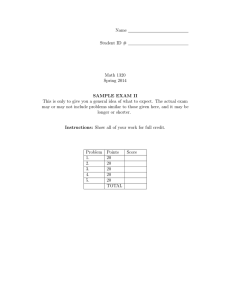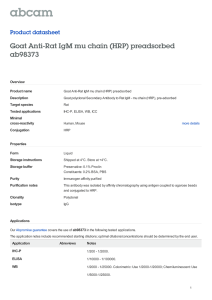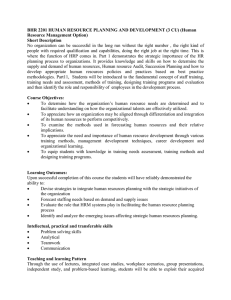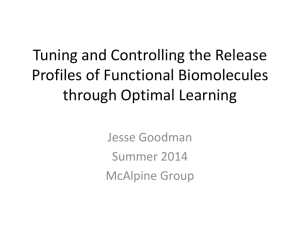HEALTH RESEARCH AND POLICY
advertisement
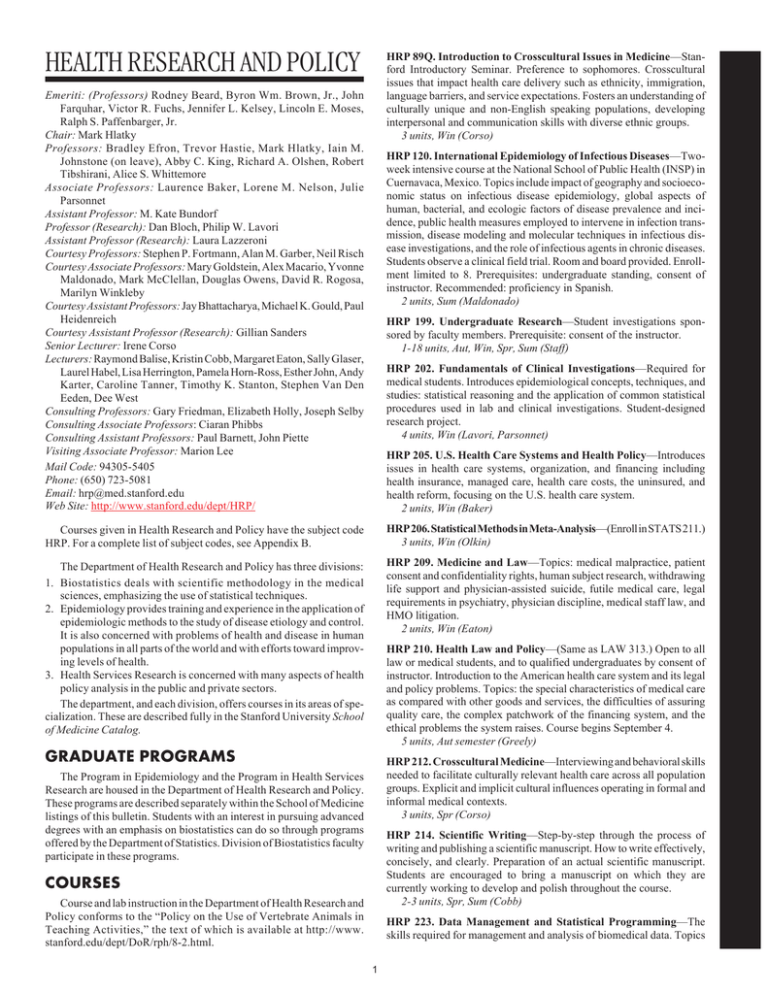
SCHOOL OF MEDICINE HEALTH RESEARCH AND POLICY HRP 89Q. Introduction to Crosscultural Issues in Medicine—Stanford Introductory Seminar. Preference to sophomores. Crosscultural issues that impact health care delivery such as ethnicity, immigration, language barriers, and service expectations. Fosters an understanding of culturally unique and non-English speaking populations, developing interpersonal and communication skills with diverse ethnic groups. 3 units, Win (Corso) Emeriti: (Professors) Rodney Beard, Byron Wm. Brown, Jr., John Farquhar, Victor R. Fuchs, Jennifer L. Kelsey, Lincoln E. Moses, Ralph S. Paffenbarger, Jr. Chair: Mark Hlatky Professors: Bradley Efron, Trevor Hastie, Mark Hlatky, Iain M. Johnstone (on leave), Abby C. King, Richard A. Olshen, Robert Tibshirani, Alice S. Whittemore Associate Professors: Laurence Baker, Lorene M. Nelson, Julie Parsonnet Assistant Professor: M. Kate Bundorf Professor (Research): Dan Bloch, Philip W. Lavori Assistant Professor (Research): Laura Lazzeroni Courtesy Professors: Stephen P. Fortmann, Alan M. Garber, Neil Risch Courtesy Associate Professors: Mary Goldstein, Alex Macario, Yvonne Maldonado, Mark McClellan, Douglas Owens, David R. Rogosa, Marilyn Winkleby Courtesy Assistant Professors: Jay Bhattacharya, Michael K. Gould, Paul Heidenreich Courtesy Assistant Professor (Research): Gillian Sanders Senior Lecturer: Irene Corso Lecturers: Raymond Balise, Kristin Cobb, Margaret Eaton, Sally Glaser, Laurel Habel, Lisa Herrington, Pamela Horn-Ross, Esther John, Andy Karter, Caroline Tanner, Timothy K. Stanton, Stephen Van Den Eeden, Dee West Consulting Professors: Gary Friedman, Elizabeth Holly, Joseph Selby Consulting Associate Professors: Ciaran Phibbs Consulting Assistant Professors: Paul Barnett, John Piette Visiting Associate Professor: Marion Lee Mail Code: 94305-5405 Phone: (650) 723-5081 Email: hrp@med.stanford.edu Web Site: http://www.stanford.edu/dept/HRP/ HRP 120. International Epidemiology of Infectious Diseases—Twoweek intensive course at the National School of Public Health (INSP) in Cuernavaca, Mexico. Topics include impact of geography and socioeconomic status on infectious disease epidemiology, global aspects of human, bacterial, and ecologic factors of disease prevalence and incidence, public health measures employed to intervene in infection transmission, disease modeling and molecular techniques in infectious disease investigations, and the role of infectious agents in chronic diseases. Students observe a clinical field trial. Room and board provided. Enrollment limited to 8. Prerequisites: undergraduate standing, consent of instructor. Recommended: proficiency in Spanish. 2 units, Sum (Maldonado) HRP 199. Undergraduate Research—Student investigations sponsored by faculty members. Prerequisite: consent of the instructor. 1-18 units, Aut, Win, Spr, Sum (Staff) HRP 202. Fundamentals of Clinical Investigations—Required for medical students. Introduces epidemiological concepts, techniques, and studies: statistical reasoning and the application of common statistical procedures used in lab and clinical investigations. Student-designed research project. 4 units, Win (Lavori, Parsonnet) HRP 205. U.S. Health Care Systems and Health Policy—Introduces issues in health care systems, organization, and financing including health insurance, managed care, health care costs, the uninsured, and health reform, focusing on the U.S. health care system. 2 units, Win (Baker) Courses given in Health Research and Policy have the subject code HRP. For a complete list of subject codes, see Appendix B. HRP 206. Statistical Methods in Meta-Analysis—(Enroll in STATS 211.) 3 units, Win (Olkin) The Department of Health Research and Policy has three divisions: 1. Biostatistics deals with scientific methodology in the medical sciences, emphasizing the use of statistical techniques. 2. Epidemiology provides training and experience in the application of epidemiologic methods to the study of disease etiology and control. It is also concerned with problems of health and disease in human populations in all parts of the world and with efforts toward improving levels of health. 3. Health Services Research is concerned with many aspects of health policy analysis in the public and private sectors. The department, and each division, offers courses in its areas of specialization. These are described fully in the Stanford University School of Medicine Catalog. HRP 209. Medicine and Law—Topics: medical malpractice, patient consent and confidentiality rights, human subject research, withdrawing life support and physician-assisted suicide, futile medical care, legal requirements in psychiatry, physician discipline, medical staff law, and HMO litigation. 2 units, Win (Eaton) HRP 210. Health Law and Policy—(Same as LAW 313.) Open to all law or medical students, and to qualified undergraduates by consent of instructor. Introduction to the American health care system and its legal and policy problems. Topics: the special characteristics of medical care as compared with other goods and services, the difficulties of assuring quality care, the complex patchwork of the financing system, and the ethical problems the system raises. Course begins September 4. 5 units, Aut semester (Greely) GRADUATE PROGRAMS HRP 212. Crosscultural Medicine—Interviewing and behavioral skills needed to facilitate culturally relevant health care across all population groups. Explicit and implicit cultural influences operating in formal and informal medical contexts. 3 units, Spr (Corso) The Program in Epidemiology and the Program in Health Services Research are housed in the Department of Health Research and Policy. These programs are described separately within the School of Medicine listings of this bulletin. Students with an interest in pursuing advanced degrees with an emphasis on biostatistics can do so through programs offered by the Department of Statistics. Division of Biostatistics faculty participate in these programs. HRP 214. Scientific Writing—Step-by-step through the process of writing and publishing a scientific manuscript. How to write effectively, concisely, and clearly. Preparation of an actual scientific manuscript. Students are encouraged to bring a manuscript on which they are currently working to develop and polish throughout the course. 2-3 units, Spr, Sum (Cobb) COURSES Course and lab instruction in the Department of Health Research and Policy conforms to the “Policy on the Use of Vertebrate Animals in Teaching Activities,” the text of which is available at http://www. stanford.edu/dept/DoR/rph/8-2.html. HRP 223. Data Management and Statistical Programming—The skills required for management and analysis of biomedical data. Topics 1 include importing and exporting data from multiple database systems, visualizing and cleaning data, data management for multicenter projects, and data security. Introduction to applied statistical programming relevant to epidemiologic and clinical research. No previous programming experience required. 2-3 units, Aut (Balise) es and complexities of achieving these aims. Recommended: HUMBIO 160 and some economics background. 1 unit (Staff) not given 2003-04 HRP 224. Statistical Issues in Epidemiology—Advanced problems in the design and analysis of epidemiological studies, motivated by published investigations. Possible topics: issues in matching controls to cases in case-control studies, methods for analyzing data from cohort studies, and methods for the design and analysis of family and genetic studies. Prerequisites: 203, 225, 226, or equivalents. 3 units (Whittemore) alternate years, given 2004-05 HRP 250C. Statistical Analysis in Educational Research: Multivariate Analysis—(Enroll in EDUC 250C.) 2-4 units, Win (Olkin) HRP 225. Design and Conduct of Epidemiologic Studies—Intermediate-level. The skills to design, carry out, and interpret epidemiologic studies particularly of chronic diseases. Topics: epidemiologic concepts, sources of data, cohort studies, case-control studies, cross-sectional studies, sampling, estimating sample size, questionnaire design, and the effects of measurement error. Prerequisite: 202 or equivalent, or consent of instructor. 3-4 units, Aut (Popat, Friedman) HRP 251. Design and Conduct of Clinical Trials—The rationale for phases 1-3 clinical trials, the recruitment of subjects, techniques for randomization, data collection and endpoints, interim monitoring, and reporting of results. Emphasis is on the theoretical underpinnings of clinical research and the practical aspects of conducting clinical trials. 3 units, Spr (Hlatky) HRP 226. Advanced Epidemiologic Methods—The principles of measurement, measures of effect, confounding, effect modification, and strategies for minimizing bias in epidemiologic studies. Prerequisite: 225 or consent of instructor. 3-4 units, Win (Nelson) HRP 256. Economics of Health and Medical Care—(Enroll in BIOMEDIN 156/256, ECON 156/256.) 5 units, Aut (Bhattacharya) HRP 252. Outcomes Analysis—(Enroll in BIOMEDIN 251.) 3 units, Spr (Bhattacharya) HRP 259. Introduction to Probability and Statistics for Epidemiology—Topics: random variables, expectation, variance, probability distributions, the central limit theorem, sampling theory, hypothesis testing, confidence intervals. Correlation, regression, analysis of variance, and nonparametric tests. Introduction to least squares and maximum likelihood estimation. Emphasis is on medical applications. 4-5 units, Aut (Cobb) HRP 228. Molecular Epidemiology—Molecular and biochemical biomarkers for measuring exposure, host susceptibility, and endpoint (disease) as applied to epidemiologic studies of infectious diseases, cancer, and other chronic diseases. Topics: DNA fingerprinting to determine transmission pathways; biochemical markers of environment exposures; study design and methodological consideration; ethical and legal issues. Prerequisite: 202 or 225, or consent of instructor. 3 units (Staff) not given 2003-04 HRP 260A,B,C. Workshop in Biostatistics—(Same as STATS 260A,B,C.) Applications of statistical techniques to current problems in medical science. Enrollment for more than 2 units of credit involves extra reading or consulting and requires consent of the instructor. HRP 260A: 1-5 units, Aut (Lazzeroni, Olshen, Bloch, Efron, Hastie, Lavori, Tibshirani) HRP 260B: 1-2 units, Win (Lazzeroni, Olshen, Bloch, Efron, Hastie, Lavori, Tibshirani) HRP 260C: 1-5 units, Spr (Lazzeroni, Olshen, Bloch, Efron, Hastie, Lavori, Tibshirani) HRP 230. Cancer Epidemiology—Descriptive epidemiology and sources of incidence/mortality data; the biological basis of carcinogenesis and its implications for epidemiologic research; methodological issues relevant to cancer research; causal inference; major environmental risk factors; genetic susceptibility; cancer control; examples of current research; and critique of the literature. Prerequisite: 202 or 225, or consent of instructor. 3 units (Staff) not given 2003-04 HRP 231. Epidemiology of Infectious Diseases—The principles of the transmission of the infectious agents (viruses, bacteria, rickettsiae, mycoplasma, fungi, and protozoan and helminth parasites). The role of vectors, reservoirs, and environmental factors. Pathogen and host characteristics that determine the spectrum of infection and disease. Endemicity, outbreaks, and epidemics of selected infectious diseases. Principles of control and surveillance. 3 units (Parsonnet) alternate years, given 2004-05 HRP 261. Intermediate Biostatistics: Analysis of Discrete Data— (Same as BIOMEDIN 233, STATS 261.) The 2x2 table. Chi-square test. Fisher’s exact test. Odds ratios. Sampling plans; case control and cohort studies. Series of 2x2 tables. Mantel Hantzel. Other tests. k x m tables. Matched data logistic models. Conditional logistic analysis, application to case-control data. Log-linear models. Generalized estimating equations for longitudinal data. Cell phones and car crashes: the crossover design. Special topics: generalized additive models, classification trees, bootstrap inference. 3 units, Win (Tibshirani, Cobb) HRP 236. Clinical Research Seminar—Weekly forum for ongoing patient-oriented research projects and recent journal articles by students, faculty, staff, and guests. Methodological and practical issues relevant to clinical epidemiologic research are also discussed. 1 unit, Aut, Win, Spr (Friedman) HRP 262. Intermediate Biostatistics: Regression, Prediction, Survival Analysis—(Same as STATS 262.) Linear and inherently nonlinear models. Prediction versus testing. Sample reuse methods. Analysis of variance. Components of variance. Introduction to multivariate analysis: the normal distribution. Principle components and k-means clustering. Survival analysis: the actuarial and Kaplan-Meier methods. The log-rank test. Weibull models. The Cox model, including estimation of baseline hazard. 3 units, Spr (Taylor, Cobb) HRP 238. Journal Club in Epidemiology—Ongoing research presented by faculty, staff, students, and guests. Recent journal articles. 1 unit, Aut, Win, Spr (Staff) HRP 240. Contemporary Issues in Health Policy: Public and Private Solutions—(Same as PUBLPOL 60/160.) Invited lecture series. Public and private policy makers address how they and their organizations aim to improve quality, access, and cost of health care in the U.S. Initiatives that address current problems of the health care system and the challeng2 Health Research and Policy HRP 241. Contemporary Issues in Health Policy: Improving Quality of Care—(Same as PUBLPOL 61/161.) Invited lecturer series. Health care, pharmaceutical, and information technology leaders review their efforts to improve quality of health care. Improvement strategies currently employed by high-performing organizations, and obstacles to widespread implementation. 1 unit (Staff) not given 2003-04 HRP 280,281,282. Spanish for Medical Students—(Same as SPANLANG 121M,122M,123M.) Goal is a practical and rapid command of spoken Spanish. Topics: the human body, hospital procedures, diagnostics, food, and essential phrases for on-the-spot reference when dealing with Spanish-speaking patients. Series can be taken independently, depending on the level of prior knowledge. 3 units, 280: Aut, 281: Win, 282: Spr (Corso) SCHOOL OF MEDICINE HRP 283. Health Services Research Core Seminar—Presentation of research in progress and tutorials in the field of health services research. 1 unit, Aut, Win, Spr, Sum (Baker, Bundorf, Garber, Hlatky, Owens) HRP 290. Advanced Spanish Conversation—Oral language skills covering pediatric, gynecological, and other specialty exams; patient health education and counseling; and diseases such as diabetes, asthma, and TB. Prerequisite: Spanish proficiency or consent of instructor. 3 units, Aut, Win, Spr (Corso) HRP 299. Directed Reading—Aspects of preventive medicine, public health, social aspects of disease and health, economics of medical care, occupational or environmental medicine, epidemiology, international health, or related fields. Prerequisite: consent of instructor. 1-18 units, Aut, Win, Spr, Sum, by arrangement with faculty HRP 391. Political Economy of Health Care in the United States— (Same as PUBLPOL 231.) The economic tools and institutional and legal background to understand how markets for health care products and services work. Moral hazard and adverse selection. Institutional organization of the health care sector. Hospital and physician services markets, integrated delivery systems, managed care, pharmaceutical and medical device industries. Public policy issues in health care, medical ethics, regulation of managed care, patients bill of rights, regulation of pharmaceuticals, Medicare reform, universal health insurance, and coverage of the uninsured. International perspectives, how other countries’ health care systems evolved, and what the U.S. can learn from their experiences. 4 units (Staff) not given 2003-04 HRP 392. Analysis of Costs, Risks, and Benefits of Health Care— (Same as MGTECON 332, BIOMEDIN 432.) For graduate students. The principal evaluative techniques for health care, including utility assessment, cost-effectiveness analysis, cost-benefit analysis, and decision analysis. Emphasis is on the practical application of these techniques. Group project presented at end of quarter. Guest lectures by experts from the medical school, pharmaceutical industry, health care plans, and government. 4 units (Garber) not given 2003-04 HRP 399. Research—Graduate students investigations sponsored by individual faculty members. Prerequisite: consent of instructor. 1-18 units, Aut, Win, Spr, Sum, by arrangement with faculty This file has been excerpted from the Stanford Bulletin, 2003-04, pages 638-640. Every effort has been made to ensure accuracy; postpress changes may have been made here. Contact the editor of the bulletin at arod@stanford.edu with changes or corrections. See the bulletin website at http://bulletin.stanford.edu for late changes. 3
